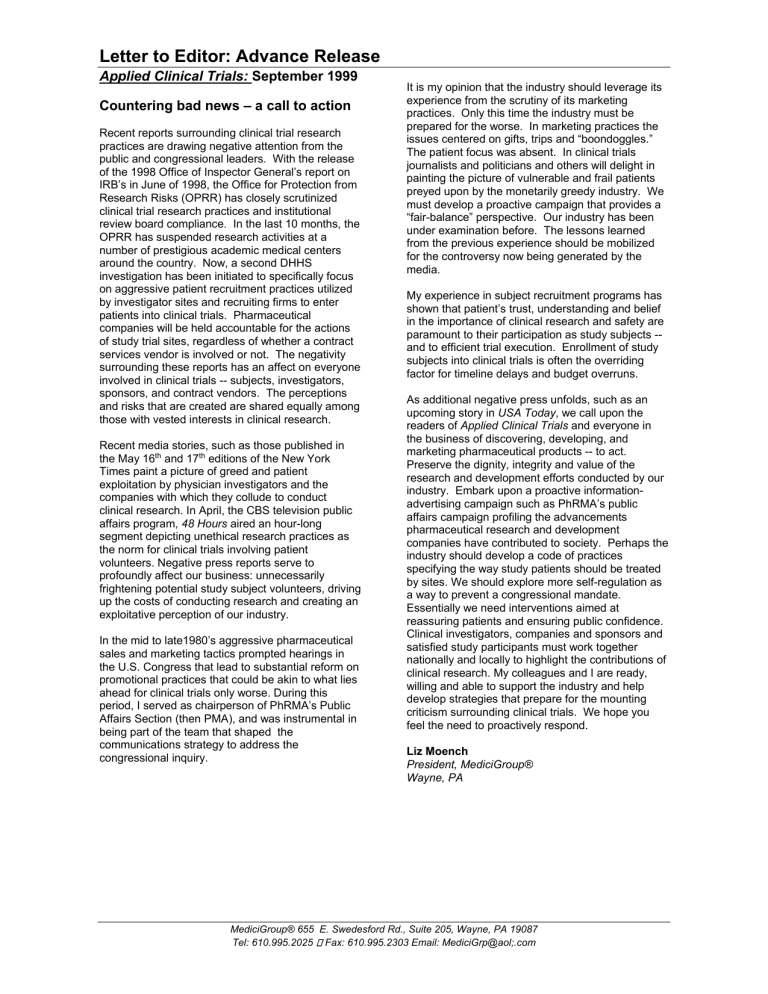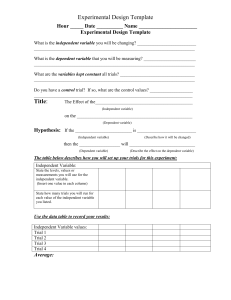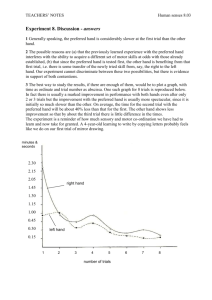
Letter to Editor: Advance Release Applied Clinical Trials: September 1999 Countering bad news – a call to action Recent reports surrounding clinical trial research practices are drawing negative attention from the public and congressional leaders. With the release of the 1998 Office of Inspector General’s report on IRB’s in June of 1998, the Office for Protection from Research Risks (OPRR) has closely scrutinized clinical trial research practices and institutional review board compliance. In the last 10 months, the OPRR has suspended research activities at a number of prestigious academic medical centers around the country. Now, a second DHHS investigation has been initiated to specifically focus on aggressive patient recruitment practices utilized by investigator sites and recruiting firms to enter patients into clinical trials. Pharmaceutical companies will be held accountable for the actions of study trial sites, regardless of whether a contract services vendor is involved or not. The negativity surrounding these reports has an affect on everyone involved in clinical trials -- subjects, investigators, sponsors, and contract vendors. The perceptions and risks that are created are shared equally among those with vested interests in clinical research. Recent media stories, such as those published in the May 16th and 17th editions of the New York Times paint a picture of greed and patient exploitation by physician investigators and the companies with which they collude to conduct clinical research. In April, the CBS television public affairs program, 48 Hours aired an hour-long segment depicting unethical research practices as the norm for clinical trials involving patient volunteers. Negative press reports serve to profoundly affect our business: unnecessarily frightening potential study subject volunteers, driving up the costs of conducting research and creating an exploitative perception of our industry. In the mid to late1980’s aggressive pharmaceutical sales and marketing tactics prompted hearings in the U.S. Congress that lead to substantial reform on promotional practices that could be akin to what lies ahead for clinical trials only worse. During this period, I served as chairperson of PhRMA’s Public Affairs Section (then PMA), and was instrumental in being part of the team that shaped the communications strategy to address the congressional inquiry. It is my opinion that the industry should leverage its experience from the scrutiny of its marketing practices. Only this time the industry must be prepared for the worse. In marketing practices the issues centered on gifts, trips and “boondoggles.” The patient focus was absent. In clinical trials journalists and politicians and others will delight in painting the picture of vulnerable and frail patients preyed upon by the monetarily greedy industry. We must develop a proactive campaign that provides a “fair-balance” perspective. Our industry has been under examination before. The lessons learned from the previous experience should be mobilized for the controversy now being generated by the media. My experience in subject recruitment programs has shown that patient’s trust, understanding and belief in the importance of clinical research and safety are paramount to their participation as study subjects -and to efficient trial execution. Enrollment of study subjects into clinical trials is often the overriding factor for timeline delays and budget overruns. As additional negative press unfolds, such as an upcoming story in USA Today, we call upon the readers of Applied Clinical Trials and everyone in the business of discovering, developing, and marketing pharmaceutical products -- to act. Preserve the dignity, integrity and value of the research and development efforts conducted by our industry. Embark upon a proactive informationadvertising campaign such as PhRMA’s public affairs campaign profiling the advancements pharmaceutical research and development companies have contributed to society. Perhaps the industry should develop a code of practices specifying the way study patients should be treated by sites. We should explore more self-regulation as a way to prevent a congressional mandate. Essentially we need interventions aimed at reassuring patients and ensuring public confidence. Clinical investigators, companies and sponsors and satisfied study participants must work together nationally and locally to highlight the contributions of clinical research. My colleagues and I are ready, willing and able to support the industry and help develop strategies that prepare for the mounting criticism surrounding clinical trials. We hope you feel the need to proactively respond. Liz Moench President, MediciGroup® Wayne, PA MediciGroup® 655 E. Swedesford Rd., Suite 205, Wayne, PA 19087 Tel: 610.995.2025 Fax: 610.995.2303 Email: MediciGrp@aol;.com



